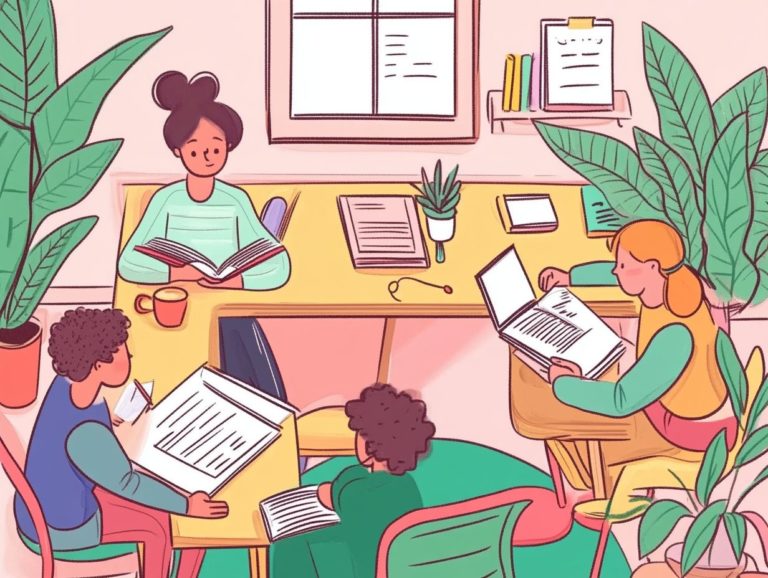the best books on study techniques
In an era filled with distractions, mastering effective study techniques is crucial for achieving academic success and fostering a commitment to lifelong learning.
This article presents a carefully curated selection of the finest books that can revolutionize your approach to studying.
From grasping the power of habits to implementing strategies for deep work, each title provides unique insights and practical tools designed to elevate your study game.
Whether you re a student fighting to maintain focus or a lifelong learner striving for excellence, these resources will inspire and empower you to study smarter, not harder!
Contents
- Key Takeaways:
- 1. The Power of Habit: Why We Do What We Do in Life and Business
- 2. Deep Work: Rules for Focused Success in a Distracted World
- 3. How to Become a Straight-A Student: The Unconventional Strategies Real College Students Use to Score High While Studying Less
- 4. Make It Stick: The Science of Successful Learning
- 5. A Mind for Numbers: How to Excel at Math and Science (Even If You Flunked Algebra)
- 6. The Organized Mind: Thinking Straight in the Age of Information Overload
- 7. Peak: Secrets from the New Science of Expertise
- 8. The 5 Elements of Effective Thinking
- 9. How We Learn: The Surprising Truth About When, Where, and Why It Happens
- 10. The Art of Learning: An Inner Journey to Optimal Performance
- 11. Mind for Numbers: How to Excel at Math and Science (Even If You Flunked Algebra)
- 12. The Study Skills Handbook (Palgrave Study Guides)
- 13. The Study Skills Book
- 14. How to Read a Book: The Classic Guide to Intelligent Reading
- 15. The Memory Book: The Classic Guide to Improving Your Memory at Work, at School, and at Play
- What Are the Most Effective Study Techniques?
- Frequently Asked Questions
- What are the best books on study techniques?
- Why are these books considered the best on study techniques?
- Do these books only focus on one specific study technique?
- Are these books suitable for all types of students?
- Do these books have any additional resources?
- Can I find these books at my local library or bookstore?
Key Takeaways:

Establishing good study habits and using effective techniques can lead to academic success. Creating a study environment free from distractions can improve concentration and retention. Using technology wisely and avoiding common study mistakes can enhance your learning process.
1. The Power of Habit: Why We Do What We Do in Life and Business
Exploring your habits reveals the reasons behind your actions in life and business. This book emphasizes the crucial impact of study habits and effective learning techniques in shaping your behaviors and decisions.
Understanding how habits function allows you to transform your classroom performance, leading to better exam preparation and overall success in your educational journey.
By diving into techniques popularized by bestselling authors and cognitive psychologists, you can discover strategies that make learning more effective and enjoyable.
For example, breaking your study sessions into shorter, focused intervals known as the Pomodoro Technique, a time management method where you work for 25 minutes and then take a short break can enhance your concentration while minimizing burnout.
Establishing a designated study environment can anchor your mind, creating a sense of readiness to absorb information. Your teachers can help by encouraging reflective practices, like journaling about your study experiences or teaching you goal-setting methods.
When you cultivate these habits, they become powerful assets that enhance your academic performance and equip you for future challenges.
2. Deep Work: Rules for Focused Success in a Distracted World
Deep Work highlights the significance of focused success in an era overflowing with distractions, offering essential guidelines for mastering time management and enhancing effective learning through dedicated practice.
This approach invites you to immerse yourself in meaningful, uninterrupted work sessions that boost your creativity and thinking skills.
By allocating specific time blocks for study, you can fully engage with your subject matter, often resulting in a deeper understanding and better retention. Imagine a graduate student dedicating two hours each evening solely to research, completely free from notifications or social media interruptions.
To further diminish distractions, consider employing techniques like the Pomodoro method, where you work intensely for 25 minutes followed by a brief break, which can significantly sharpen your focus.
Create a space where you can focus deeply, such as a quiet library or a designated workspace. This not only enhances your concentration but also fosters a sense of commitment that carries over into professional realms, giving you the power to tackle complex projects with renewed efficiency.
3. How to Become a Straight-A Student: The Unconventional Strategies Real College Students Use to Score High While Studying Less
Uncover the secrets to becoming a straight-A student by adopting unconventional study habits and learning techniques used by real college students to excel academically while studying less.
These innovative strategies often involve methods like spaced repetition, where you review information at increasing intervals to enhance long-term retention, or employing mnemonic devices that forge mental associations for easier recall.
Successful students frequently highlight the significance of a balanced study routine, incorporating breaks and physical activity to maintain focus and prevent burnout.
By optimizing your study environment and employing visualization techniques, you ll find that not only do your grades improve, but you also cultivate a healthier approach to learning, manage your time effectively, and enjoy the rewards of both academic and personal growth.
By embracing these techniques, you re on your way to studying smarter and achieving your goals!
4. Make It Stick: The Science of Successful Learning
Make It Stick unveils the science behind successful learning, revealing how the way our minds work can elevate your learning experience through strong scientific evidence and proven techniques.
This enlightening resource delves into cognitive psychology, showcasing how your brain processes and retains information. You ll discover vital strategies like retrieval practice, which involves reviewing material over increasing intervals of time, spaced repetition, and interleaved practice all essential for enhancing retention and comprehension.
Both students and teachers can leverage these principles to develop improved study habits, creating environments that emphasize active engagement rather than passive learning. By incorporating small, consistent review sessions and varying subjects, you can solidify your knowledge far more effectively.
Ultimately, grasping these cognitive mechanisms gives you control of your educational journey. This knowledge also provides educators with the tools to craft more impactful teaching methodologies.
5. A Mind for Numbers: How to Excel at Math and Science (Even If You Flunked Algebra)
A Mind for Numbers gives you the power to excel in math and science by revealing effective learning techniques and insights from cognitive psychologists, even if foundational concepts like algebra have posed challenges in the past.
The book emphasizes the significance of cultivating a growth mindset, enabling you to perceive challenges as opportunities for growth rather than insurmountable obstacles.
With practical strategies such as spaced repetition and the Pomodoro technique, it guides you in managing your study time effectively, fostering a deeper understanding and better retention of material.
The text also offers invaluable tips for overcoming common fears associated with math and science, highlighting the importance of practice and persistence.
Through relatable anecdotes and actionable advice, you ll be equipped to tackle your academic hurdles with renewed confidence and resilience.
6. The Organized Mind: Thinking Straight in the Age of Information Overload
The Organized Mind serves as your compass for navigating the tumultuous waters of information overload, giving you powerful strategies to conquer your studies!
In a world teeming with distractions and endless information at your fingertips, this book explores methods for creating a structured approach to studying and retaining knowledge. By embracing techniques like prioritizing tasks, leveraging digital tools for organization, and breaking down complex subjects into bite-sized pieces, you can significantly enhance your academic efficiency.
These strategies resonate powerfully in today s fast-paced educational landscape, where juggling multiple assignments and mastering time management has become essential for success. By cultivating these organizational skills, you not only improve your comprehension but also foster a more balanced and fulfilling lifestyle.
7. Peak: Secrets from the New Science of Expertise

Peak unveils the secrets from the new science of expertise, providing you with insights into effective learning strategies and the psychological principles that can drive you to achieve your best.
As you delve into this comprehensive exploration of skill acquisition, you’ll discover the importance of deliberate practice and how focused effort can significantly enhance your abilities. The book draws on the latest research from cognitive psychologists, showing that when you understand your own learning processes, it can dramatically elevate your mastery levels.
For you, applying these findings means embracing structured methods that not only promote retention but also unleash your full potential. When you adopt a growth mindset and recognize the value of feedback, you place yourself in a prime position to adapt your approaches.
This mindset paves the way for sustained progress and expertise in your chosen fields, ensuring you keep pushing boundaries and achieving greatness!
8. The 5 Elements of Effective Thinking
The 5 Elements of Effective Thinking offer a powerful framework for enhancing your thinking skills, equipping you with actionable learning and memory techniques that can lead to remarkable improvements in your educational outcomes.
By cultivating these elements understanding, focus, persistence, flexibility, and experimentation you can significantly elevate your academic performance.
For instance, when you practice understanding by breaking down complex subjects into manageable parts, you ll likely find it much easier to grasp challenging concepts. Maintaining focus helps you concentrate on relevant information without distractions, a crucial skill during exam preparation.
Persistence encourages you to view challenges as opportunities rather than setbacks. A flexible mindset enables you to adapt to new information or methods, ultimately enhancing your overall effectiveness.
Embracing experimentation invites you to take risks in your learning journey, such as trying out different study techniques. These strategies can lead to deeper insights and mastery in your subjects.
9. How We Learn: The Surprising Truth About When, Where, and Why It Happens
How We Learn uncovers the surprising truths about when, where, and why learning takes place, all supported by scientific evidence that shapes effective studying techniques and educational psychology.
This exploration into the mechanics of learning invites you to challenge long-held beliefs about rote memorization and passive absorption. Instead, it offers a more dynamic perspective on education, emphasizing the significance of reviewing information over spaced intervals to improve memory, retrieval practice, and actively engaging with the material.
The book illustrates how you can significantly enhance retention and understanding not only through traditional methods but also by adopting a holistic approach that includes self-testing and diverse study environments.
Implementing these insights helps you embrace practical strategies that improve your learning outcomes, giving you the power to tackle complex subjects with greater confidence and efficiency.
10. The Art of Learning: An Inner Journey to Optimal Performance
Dive into The Art of Learning for an exciting journey toward optimal performance. It shares personal experiences and effective learning techniques designed to elevate your class performance across various disciplines.
By exploring the nuances of cognitive development and emotional resilience, this guide encourages you to reflect on your unique learning styles and the challenges you face. It nudges you to adopt flexible strategies, such as goal-setting, effective note-taking, and cultivating self-awareness each of which can significantly enhance your academic outcomes.
Through relatable anecdotes and practical advice, you’ll discover inspiration to nurture your curiosity and perseverance, ultimately transforming your educational experience.
In this way, learning evolves into more than just a technique; it becomes a lifelong pursuit of knowledge that fosters both personal and academic growth.
11. Mind for Numbers: How to Excel at Math and Science (Even If You Flunked Algebra)
Mind for Numbers is designed with you in mind, focusing on learning and memory techniques specifically tailored to help you excel in math and science. It draws upon valuable insights from cognitive psychologists to support those who may find these subjects challenging.
You ll discover strategies that promote active engagement, such as spaced repetition and visualization, allowing you to connect abstract theories with real-world examples.
By utilizing mnemonic devices, you ll significantly enhance your memory retention of formulas and key concepts, making them much easier to recall during exams.
Interleaving practice gives you the power to develop a deeper understanding of previously learned material while honing the problem-solving skills necessary for tackling complex scientific equations.
Ultimately, these approaches not only boost your confidence but also transform the learning experience into something enjoyable, inspiring you to explore math and science with curiosity rather than fear.
12. The Study Skills Handbook (Palgrave Study Guides)
The Study Skills Handbook is your essential companion, providing you with practical study habits and effective learning techniques designed to elevate your exam preparation and academic achievements.
This handbook explores important skills such as time management, note-taking strategies, and active reading reading with a focus on understanding and engaging with the content each playing a vital role in deepening your understanding and retention.
By using effective time management techniques, you can designate specific study blocks, ensuring you thoroughly cover your material instead of resorting to frantic last-minute cramming.
Utilizing note-taking methods, such as the Cornell system, helps you organize information logically, making your revision process far more efficient. By integrating these skills into your daily routine, you not only cultivate better habits but also establish a solid foundation for enduring academic success.
13. The Study Skills Book
The Study Skills Book serves as an invaluable resource for you, guiding you in refining your study habits and adopting effective learning methods that pave the way for successful exam preparation.
This guide doesn t just scratch the surface; it delves into foundational techniques for organizing your materials and managing your time efficiently. It also introduces advanced memory techniques, such as spaced repetition and mnemonic devices, that can elevate your learning experience.
By using these strategies, you ll enhance your retention and significantly boost your performance across various subjects whether you re tackling complex math problems, memorizing historical dates, or mastering intricate scientific concepts.
The book also emphasizes the importance of tailoring these methods to suit your individual study style, giving you the power to not only prepare for exams but also cultivate lifelong learning skills that will serve you well beyond the classroom.
14. How to Read a Book: The Classic Guide to Intelligent Reading

How to Read a Book is a timeless guide that introduces you to the art of intelligent reading, providing strategies designed to enhance effective learning and elevate your study habits.
The techniques presented in the book skimming, detailed reading, and analytical reading help you engage with texts in a more thoughtful and purposeful manner. Using these methods helps you grasp complex ideas and retain information with greater efficacy.
The focus on curating a reading list that aligns with your personal interests and knowledge gaps is essential. This ensures that the material you engage with is not just stimulating but also relevant, fostering deeper insight and critical thinking. This tailored approach transforms reading from a mundane chore into a truly enriching and transformative experience.
15. The Memory Book: The Classic Guide to Improving Your Memory at Work, at School, and at Play
The Memory Book serves as a timeless resource for enhancing memory, equipping both students and teachers with powerful learning strategies grounded in cognitive psychology.
By exploring mnemonic devices, visualization techniques, and spaced repetition, you’ll unlock powerful techniques to dramatically boost your memory across diverse learning settings.
For students, these methods turn ordinary study sessions into engaging experiences, enabling the efficient memorization of extensive information for exams. Professionals can harness similar techniques to elevate productivity, allowing for effective workload management by remembering crucial details and deadlines.
By embracing these memory strategies, you not only pave the way for academic achievement but also enhance communication and collaboration in the workplace, ensuring that valuable knowledge is readily accessible when it s needed the most.
What Are the Most Effective Study Techniques?
Exploring effective study techniques reveals many methods to boost your learning. These can refine your study habits and improve exam preparation.
Among these methods are spaced repetition, active recall, and the Pomodoro technique each backed by robust research.
Spaced repetition involves revisiting information at increasing intervals, a strategy proven to bolster long-term retention. Language learners using spaced repetition software often report significant vocabulary gains.
Active recall emphasizes retrieving information from memory think flashcards or practice tests. Studies show this approach dramatically improves retention compared to passive review.
The Pomodoro technique breaks your study sessions into focused intervals, typically lasting 25 minutes, followed by short breaks. This strategy boosts productivity and helps maintain motivation over extended periods.
These techniques promote efficient studying and cultivate a deeper understanding of the material.
How Can One Create a Productive Study Environment?
Creating a productive study environment is vital for effective learning. It fosters habits that enhance time management and focus during study sessions.
A well-designed space minimizes distractions and creates a space that promotes concentration and engagement.
Tailor your surroundings to fit your needs ensure you have adequate lighting, comfortable seating, and easy access to study resources.
Keep the area organized to reduce clutter and stress, making transitions between tasks smoother.
A positive environment significantly influences learning outcomes, nurturing creativity and boosting motivation. The right space can lead to improved academic performance.
What Are the Common Mistakes Students Make When Studying?
Understanding common mistakes students make while studying can enhance your study habits. This insight helps pinpoint pitfalls like procrastination and ineffective note-taking, which can derail committed learners.
To tackle procrastination, break tasks into smaller, manageable chunks and set specific deadlines; these strategies can be game-changers.
Using effective note-taking methods, like the Cornell method or mind mapping, can organize chaotic thoughts into clear information.
Self-reflection is crucial for fine-tuning your study routines. Regularly assessing what works fosters adaptability and deepens your connection to the learning process. This enables you to engage more fully in your studies.
How Can One Improve Their Memory for Better Studying?
Improving your memory through targeted techniques enhances studying effectiveness. These methods transform study habits and foster better retention of information.
Utilize mnemonic devices clever memory aids that create acronyms or phrases to make sense of complex information. When preparing for exams, craft a catchy sentence where each word starts with the same letter as the concepts you’re studying.
Visualization is a powerful technique; envisioning information as vivid images helps solidify memories. Imagine a historical timeline as a colorful road map, with each stop representing a key event.
Incorporating these methods into your daily study sessions makes the material more engaging and memorable, ultimately boosting academic performance.
What Are the Benefits of Using Technology for Studying?
Using technology for studying has many advantages. It can improve your study habits and provide useful learning tools.
By incorporating various apps into your study routine, you can boost productivity and stay engaged. Online platforms offer a wealth of information, making complex topics easier to understand.
Productivity software helps you organize your materials and set schedules. This makes it simple to prioritize tasks and track your progress. Celebrate small victories along the way.
Embrace technology as your ultimate partner in achieving academic success!
Frequently Asked Questions

What are the best books on study techniques?
Some of the best books on study techniques include “Make It Stick” by Peter C. Brown, “A Mind for Numbers” by Barbara Oakley, and the best study techniques for STEM students by various authors, including “The Power of Habit” by Charles Duhigg.
Why are these books considered the best on study techniques?
These books are highly regarded because they are well-researched and effective in improving study methods, including insights into the science behind study techniques and learning. They provide practical tips that fit easily into daily routines.
Do these books only focus on one specific study technique?
No, these books cover numerous study techniques. This includes memorization, time management, note-taking, and developing good study habits.
Are these books suitable for all types of students?
Yes, they fit high school students, college students, and lifelong learners. Their techniques apply to various subjects and learning styles.
Do these books have any additional resources?
Yes, some include online resources like practice quizzes and study tools. Authors may also offer online courses for a deeper understanding.
Can I find these books at my local library or bookstore?
Yes, these books are widely available in libraries and bookstores. You can also find them online in physical and digital formats.
Don’t wait start enhancing your study skills today with these essential resources!






